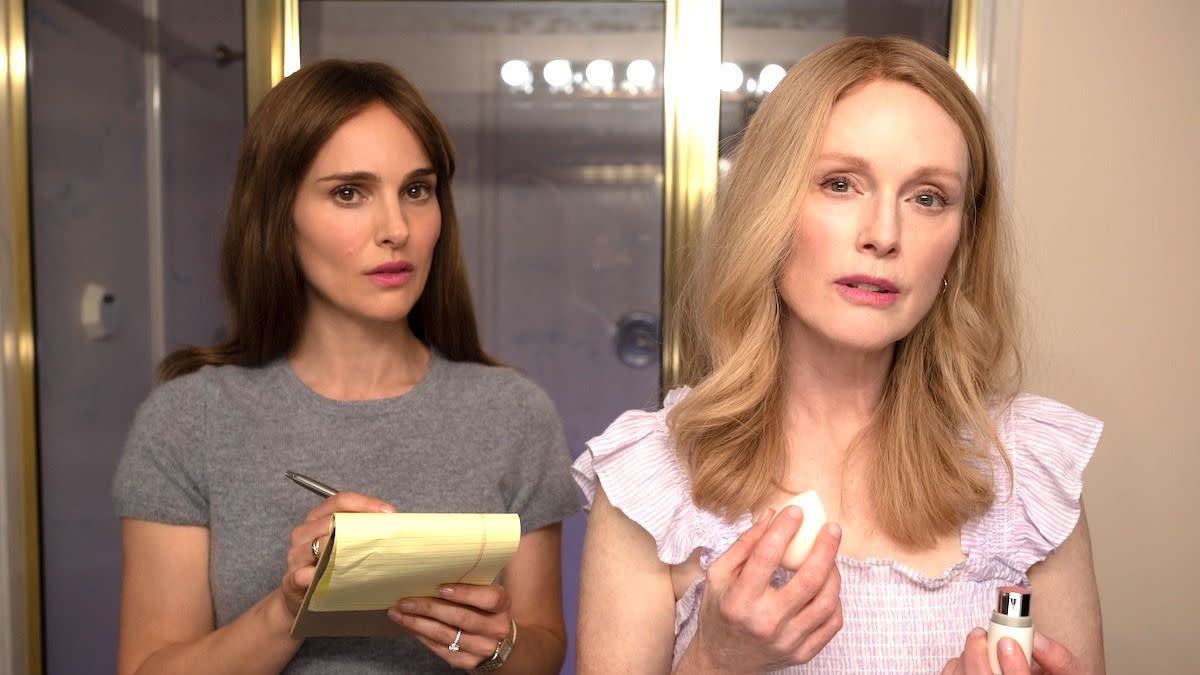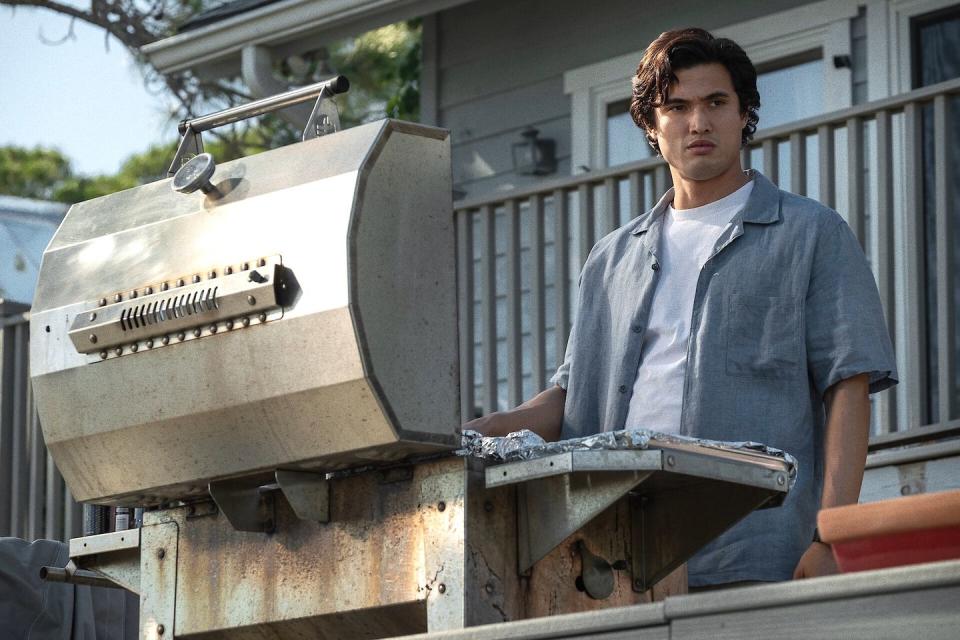‘May December’ Has 2023’s Most Thought-Provoking Ending

- Oops!Something went wrong.Please try again later.
- Oops!Something went wrong.Please try again later.
The following story contains spoilers for the ending of May December.
AT IT'S VERY core, May December is a challenge. The movie, which comes from director Todd Haynes and stars Natalie Portman, Julianne Moore, and Charles Melton, has a complicated, messy premise (one based on an uncomfortable and disturbing true story) that promises all the uncomfortable drama that eventually follows.
It tells the story of an actress named Elizabeth (Portman), who arrives in Savannah, Georgia, to spend time with a couple named Gracie and Joe (Moore and Melton) as research for a role she's set to play in an upcoming film. Why is she shadowing them? That's where the first dark twist comes in: the couple first got together nearly two decades earlier, when Gracie was in her mid-30s and Joe was only in middle school. Gracie eventually went to jail for statutory rape, having Joe's child while behind bars; once she got out, the couple remained together and got married. They now have three kids, including twins who are about to graduate high school.
Gracie and Joe welcome Elizabeth in, hoping that the time spent together will help her to, essentially, "get the story right"; one of the film's major tensions is what each party really wants to get out of this movie being made.
As the movie continues, though, it's clear that—again—nothing about this scenario is going to be simple. As Elizabeth learns more and more about Gracie and Joe, she falls deeper and deeper down their wormhole, and as we learn more about Gracie and Joe (and their surrounding family), we learn more and more about the ripple effect that the beginning of their relationship (and everything that has come after it) has had.
Nothing about May December is simple, so it's fitting that the movie's ending is accordingly and purposefully unclear. One of the movie's posters, even, is drawn to model a Rorschach test; what anyone sees, here, really, is their own interpretation.
As May December concludes, though, we know you may be looking for what to make of everything. So we chose to break things down, below, by each of our three principle characters.
Gracie (Julianne Moore) Confronts Elizabeth

There are a few key moments involving Gracie that the film leaves us with that are worth diving into. Above all else, there seems to be one overarching fact about Gracie: she does not have any regrets for her relationship with Joe. From the opening moments of the movie—potentially not having enough hot dogs was the worst thing weighing on her conscience—to one of her final scenes—refusing to acknowledge Joe's breakdown about his youth in their bedroom—it's clear that she thinks the way she thinks about this, and is essentially delusional about what she's done and the reality she's created.
Gracie's final scene in the movie features a confrontation at the graduation between Elizabeth and Gracie, where Gracie tells Elizabeth that she knows about an accusation that Georgie (Cory Michael Smith) made earlier (that Gracie was molested by her older brothers as a child), and that it's a lie. She tells Elizabeth that she and Georgie talk every day (contrary to what we've heard earlier in the film) and that she's "secure." (Because, as we all know, anyone who claims to be "secure" could not possibly be insecure.)
Still: it forces us to reevaluate everything we've seen and know about Gracie and her family to this point. There's no question that an irreparable amount of damage has been done to Joe, and a storm of ripple effects have come in the aftermath. But Elizabeth, and the viewer, are left wondering how much of what we saw with Gracie and her entire family was real. But the truth remains what we saw from the very beginning—as "secure" as Gracie thinks she is, that's the whole point. She's done something unforgivable, but cannot grasp her own mind to the truth of it.
But as we'll get to when we discuss Elizabeth, it's not sure if Elizabeth is able to grasp that duality.
Joe (Charles Melton) Faces His Future

The most complicated character in May December has the most open-ended ending. As we mentioned above, it's clear that Joe's relationship with Gracie has caused years and years of irreparable damage. That's clear throughout the film, including in the late film bedroom scene and even when Joe sits on the roof with his son smoking a joint; the dynamics are bizarre, because the twins have matured emotionally beyond where Joe ever got the chance of going, and Melton does a fantastic job in his portrayal of this.
Joe, standing back by a fence while Gracie sits in the stands, has an incredibly emotional reaction to the twins graduating from high school. With his first daughter already away at college, this is now the first time since Joe was in 7th grade that he's got an empty nest at home. Just as he's seeing his kids granted the freedom to do whatever they want with their life—a freedom that he never had—he's feeling what Elizabeth told him earlier: that he has the chance to start over.
We already saw earlier in the movie that Joe is, at least, thinking about it. He asked his friend from the Monarch butterfly Facebook group to go on a trip, and while she reminded him that he was married, it's clear that getting away and starting anew is something that's on Joe's mind—and, in an ideal, happy world, something we can imagine he could really do.
(The real Vili Fualaau, upon whom Joe is based, split up with Mary Kay Letourneau, upon whom Gracie is based, in 2019, a year before her death.)
Elizabeth (Natalie Portman) Is Not What She Seems

There's so much going on with Elizabeth's character, but we should first discuss a throughline that's present throughout the movie: the fact that she's a television actor (her show, Noah's Ark, seems to be at least a little ridiculous, and she seems at least a little ashamed of it) looking to make a jump into being a Serious Movie Actor. But all anyone ever talks about when meeting her is her TV show. The way others interact with Elizabeth make it very clear why she's so serious about wanting to immerse herself into this new character and be taken seriously.
There are moments throughout the movie where Elizabeth clearly loses the plot and is without question in too deep; this is apparent during her phone call with the film's director, and if that wasn't clear, when she sleeps with Joe will certainly do it. "That's what adults do," she tells him when he suggests that they had a real connection. These are two people who are just about the same age (as Elizabeth points out early on in the film), but, at this point, this still feels wrong based on everything we've learned about both characters to this point in the film.
After the graduation scene (and the interaction between Gracie and Elizabeth that we discussed earlier in Gracie's section), we get one final scene of Elizabeth, in character as Gracie.
It's a doozy. It turns out that Elizabeth's movie is not, in fact, a prestigious picture. In fact, it looks to be exactly the type of corny, cheesy, movie that she was watching on TV earlier in the movie. She can try to do Gracie's lispy voice all she wants, but all the havoc she caused—both for herself and for Joe and Gracie's universe—seems at it's core to be for nothing. As the director wants to move onto another scene, Elizabeth is seen begging, pleading, for one more, because, as she claims, she's close to capturing something true.
But, as the whole movie seems to argue: is she? May December is a wonderful portrait of a number of complicated and complex human relationships, some deranged (Joe and Gracie), others perhaps more relatable (mother-daughter, father-son, adult-adult).
With Elizabeth, we see, first and foremost, a clinical case of method acting gone too far. But perhaps on a more relatable level, we see the dangers of losing track of who people really are, and who they want to become.
You Might Also Like

